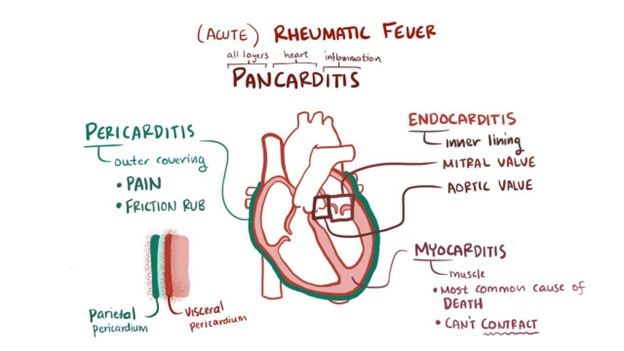A nurse is admitting an infant who has severe dehydration from acute gastroenteritis. Which of the following findings should the nurse expect?
13% weight loss
Bulging anterior fontanel
Bradypnea
Capillary refill 3 seconds
The Correct Answer is A
Nursing Test Bank
Naxlex Comprehensive Predictor Exams
Related Questions
Correct Answer is C
Explanation
Rheumatic fever (RF) is a complication that can occur after an untreated or inadequately treated streptococcal throat infection (strep throat). It can affect the heart, joints, skin, and brain. One important aspect of managing RF is to prevent further episodes of strep throat, as it can trigger recurrent RF. Therefore, the child with a history of RF will require prophylactic antibiotics (usually penicillin or a related antibiotic) before certain invasive procedures, dental work, or surgeries to prevent strep throat and subsequent recurrence of RF.

Option A is not specific to rheumatic fever, and while electrolyte imbalances may be monitored and managed in certain cases of severe illness, it is not a core aspect of managing RF.
Option B is not accurate. While many children with RF do recover fully with appropriate treatment, they may be at risk of developing rheumatic heart disease, which can lead to long-term complications if not managed properly.
Option D is not a direct implication of RF. Rheumatic fever is not a genetically inherited condition, but a complication of strep throat caused by a bacterial infection. There is no evidence to suggest that having RF would directly affect the genetic implications for future offspring.
Correct Answer is ["260"]
Explanation
To calculate the total fluid intake, we need to convert all the measurements to milliliters (mL) and then add them up:
1 cup = 240 mL
1 oz = 30 mL
Given fluid intake:
Juice: ½ cup = 0.5 * 240 mL = 120 mL
Gelatin: 3 oz = 3 * 30 mL = 90 mL
Ice pop: 1 oz = 1 * 30 mL = 30 mL
Ginger ale: 20 mL
Total fluid intake = 120 mL + 90 mL + 30 mL + 20 mL = 260 mL
So, the nurse should record 260 mL as the child's fluid intake.
Whether you are a student looking to ace your exams or a practicing nurse seeking to enhance your expertise , our nursing education contents will empower you with the confidence and competence to make a difference in the lives of patients and become a respected leader in the healthcare field.
Visit Naxlex, invest in your future and unlock endless possibilities with our unparalleled nursing education contents today
Report Wrong Answer on the Current Question
Do you disagree with the answer? If yes, what is your expected answer? Explain.
Kindly be descriptive with the issue you are facing.
